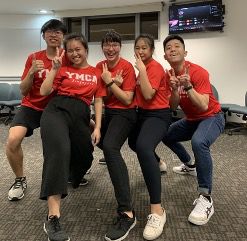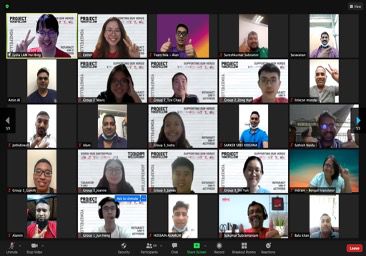Lee Kong Chian School of Business student Lydia Lam shares how she overcame setbacks during her term as Project Yokefellow student leader by fixing her sight on the purpose and meaning of her work.

Covid-19 has had a significant impact on our lives and community service projects were not exempt from the restrictions and guidelines which affected the feasibility and survivability of many projects. Some projects have shuttered, while others were born from the opportunities that Covid-19 has presented.
I am a member of SMU Rotaract Club, a youth development club that emphasises service over self, as well as achieving fellowship through community service, professional development and club service. When I was elected into Rotaract’s Executive Committee as a Project Director, I was slated to take over Project Silver. It was a project to provide companionship and joy to the elderly who are in their silver years, through interactions with volunteers during regular befriending sessions. I was really excited for this opportunity to make a difference to the lives of the elderly. However, it was over before it began. Covid-19 made interacting with the elderly unfeasible as they are in a high-risk group and the organisation did not have the necessary resources to conduct online sessions. After discussion with the team and the organisation, we had no choice but to discontinue with Project Silver.
One day, however, staff from C4SR approached me and asked if I would be interested in a project working with migrant workers. Thus, the Rotaract Club decided to take this on as Project Silver’s successor project! That was how I became the Project Director of Project Yokefellow.
Project Yokefellow is a collaborative project between Rotaract and Uni-Y, another community service CCA in SMU, which works with the migrant worker community in Singapore. The name Yokefellow derives from being yoked equally with our fellow migrant workers, so that they can share their burdens with us and feel less stressed and lonely amidst the Covid-19 restrictions.
We wanted to show that we care and provide a space for them to talk about their joys and woes in life and work. At the same time, to encourage and foster cultural exchange, we sought to share aspects of Singapore culture with them such as our local food, festivities, and traditions. We felt that Yokefellow would be a meaningful project as it not only sheds light on the plight of migrant workers in Singapore, who are one of the most marginalised groups of people here, but also enables us to make a difference in their lives - to make them feel appreciated and welcome in a foreign land.
However, since it was the first time SMU had ever worked with this beneficiary group, there were many hurdles we had to overcome before the project could become a reality. The first thing we did was to conduct a pilot run to test out the feasibility of the project. Unfortunately, we faced difficulties trying to find an organisation that was suitable and was willing to work with us. Many organisations felt that we were inexperienced, and most were unable to accommodate an additional programme due to the Covid-19 restrictions, aside from administrative and logistical issues.
The team took the initial struggles we faced in our stride as it was a valuable learning process for all of us. Through the rigours of coordinating and communicating between organisations and communities, we learnt how to better adapt to uncertain circumstances. The pilot project was eventually a success where we managed to engage with many migrant workers. This gave us the confidence to move on to launch the project.
After the success of the pilot run, I expected the official launch of Project Yokefellow to go smoothly and be a rousing success as well. However, the reality was quite different from what I had anticipated. Execution of Project Yokefellow was riddled with difficulties of its own: the initial project deadline had to be pushed back as we were unable to confirm a dormitory that was available for us to access. After settling that issue, not a single migrant worker showed up during the first few sessions due to miscommunication on publicity issues with the organisation.
We then decided to put our project on hold and re-assessed the feasibility of the project. This delayed our initial timeline even further and I struggled to manage the expectations of my volunteers as I was unable to confirm whether the project would be able to resume. Despite this, Uni-Y’s Project Director and I remained determined to achieve Yokefellow’s vision and purpose and to deliver what we have promised to the volunteers.
We worked closely with our partner organisation to source for another dormitory that was willing and able to work with us. Just as we found one, Covid-19 restrictions on the migrant dormitories made it impossible to execute our plans once again, which resulted in us postponing the project even more.
Eventually, after five months, we were able to successfully complete the project and engage with the migrant community through interactive games and activities, quizzes and befriending sessions. Hearing them share about their families at home, and how determined they were to continue working to provide for their families despite all the hazards and long hours was truly inspiring. At the end of each session, seeing the smiles of the migrant workers at the end of each engagement session gave me the reassurance that Project Yokefellow had fulfilled its purpose.

The road to establishing Project Yokefellow as an official project was not an easy one, both during the planning phase but also during the execution phase where attendance of the migrant workers during the initial sessions were low and many volunteers dropped out along the way due to the project delays. It was very discouraging for me to see these things and I was filled with doubt as to whether the project could continue or if I was doing enough as a leader. Honestly, I did feel like giving up, because it felt as if all the odds were stacked against me and nothing seemed to be going according to plan. However, I resolved to persevere and continue leading the project to the best of my ability - not for anyone else, but for the migrant worker community we sought to help. After all, the nature of community service is placing others over self and it was this belief that helped me during the toughest periods.
This is the hope that I have for future volunteers: to see the purpose and meaning in what you are doing and draw passion and motivation from it, so that you do not lose sight of what you want to achieve on your journey. This does not only apply to community service, but to every aspect in life. We all face trials and tribulations that may leave us feeling defeated – whether it is trying to meet tight project deadlines, cope with overwhelming schedules or juggling the various responsibilities we have. It is okay to be disheartened and it is normal to get knocked down, but always remember that these setbacks do not define us; it is how we overcome these challenges that define our mettle and prove that we are greater than our pain. This is what resilience is after all.